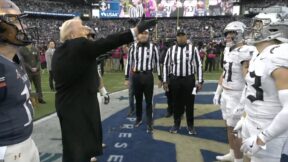Former National Institutes of Health Director Admits to ‘Narrow,’ ‘Really Unfortunate’ Pandemic Mindset: ‘We Weren’t Thinking’ About Collateral Damage
Former National Institutes of Health director Francis Collins admitted to having a “narrow,” “really unfortunate” mindset during the Covid-19 pandemic that prevented himself and other public health officials from considering the potential collateral damage of their decisions at an event earlier this year — which has resurfaced online Thursday.
“As a guy living inside the Beltway, feeling a sense of crisis, trying to decide what to do in some situation room in the White House with people who had data that was incomplete. We weren’t really thinking about what that would mean to Wilk and his family in Minnesota, a thousand miles away from where the virus was hitting so hard. We weren’t really considering the consequences in communities that were not New York City or some other big city,” explained Collins.
He continued:
The public health people — we talked about this earlier and this really important point — if you’re a public health person and you’re trying to make a decision, you have this very narrow view of what the right decision is. And that is something that will save a life; it doesn’t matter what else happens. So you attach infinite value to stopping the disease and saving a life. You attach zero value to whether this actually totally disrupts people’s lives, ruins the economy, and has many kids kept out of school in a way that they never quite recover from. So, yeah, collateral damage. This is a public health mindset and I think a lot of us involved in trying to make those recommendations had that mindset and that was really unfortunate. It’s another mistake we made.
Collins served as NIH director from August 2009 through December 2021. He has been criticized by those who believe the U.S. government’s response to the pandemic was overly invasive and burdensome as well as advocates of the lab-leak theory of Covid origin.
Watch above via Phil Kerpen on X.




